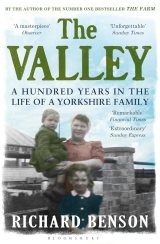Stephen Priest
Consilium Education library specialist, Sal Flint continues her column – School Readers – in which she talks to educators about their favourite books. This month’s Reader is the Principal of the British School of Tbilisi. Stephen Priest.
Why ‘School Readers’?
We all urge kids to read, but how has reading shaped our own personal and professional lives? I want to know which four books have most influenced the people I talk to – an unforgettable children’s book, a novel, a work of non-fiction and a ‘go-to’ book about education.
 This month’s School Reader is Stephen Priest. Originally from the Dearne Valley in South Yorkshire, Stephen studied Geography at Staffordshire University and his PGCE at Manchester Metropolitan University.
This month’s School Reader is Stephen Priest. Originally from the Dearne Valley in South Yorkshire, Stephen studied Geography at Staffordshire University and his PGCE at Manchester Metropolitan University.
In a career now spanning over 30 years, Stephen has taught Geography in the UK, was the IB Coordinator at the Berlin British School and the Vice Principal at The British School Kathmandu. Stephen joined the British International School of Tbilisi in August 2017 as Principal. He is also the Chair of the Black Sea Schools group of COBIS member schools, a COBIS Lead Improvement Partner and a NPQH facilitator in the UCL Black Sea Schools NPQ collaboration.
Stephen Priest’s ‘four books’
(Click the book cover to follow the link to Amazon)
1. Richard Benson: The Valley
 Type into Google, books about South Yorkshire and the list is long – it should be, we have a rich social and industrial history – but many of these books are not the most inspiring of reads being largely historical factuals. Refine the list to novels and it shortens dramatically, but with the exception of Helen Cadbury’s Sean Denton series about a young dyslexic policeman and the book the film was based on, Get Carter, both set in Doncaster, most of these novels are in Sheffield or invented locations such as Silverwood’s DI Angel novels. We have few to choose from for the Dearne Valley – with the exception of Barry Hines and the phenomenal A Kestrel for a Knave (which would be book number 5 if allowed). And then I came across The Valley – set in the former pit villages on the North bank of the River Dearne, just a mile or so across the river from my hometown of Wath-Upon-Dearne. To read about a family history that mirrors in many ways that of my own was entertaining, emotional and deeply resonant. I recommend this book to anyone – not just those of us who come from the valley itself.
Type into Google, books about South Yorkshire and the list is long – it should be, we have a rich social and industrial history – but many of these books are not the most inspiring of reads being largely historical factuals. Refine the list to novels and it shortens dramatically, but with the exception of Helen Cadbury’s Sean Denton series about a young dyslexic policeman and the book the film was based on, Get Carter, both set in Doncaster, most of these novels are in Sheffield or invented locations such as Silverwood’s DI Angel novels. We have few to choose from for the Dearne Valley – with the exception of Barry Hines and the phenomenal A Kestrel for a Knave (which would be book number 5 if allowed). And then I came across The Valley – set in the former pit villages on the North bank of the River Dearne, just a mile or so across the river from my hometown of Wath-Upon-Dearne. To read about a family history that mirrors in many ways that of my own was entertaining, emotional and deeply resonant. I recommend this book to anyone – not just those of us who come from the valley itself.
What it’s about:
The Valley is a dramatised family history detailing the lives of the author’s recent ancestors in the lower Dearne Valley, focussing on life in a mining community, the decline of the industry and its impact on the community. Richard Benson describes the challenges faced by his family and their neighbours, including poverty, personal tragedies and many of the social problems seen in such communities. Despite these hardships, he highlights the resilience and humour of the people in this part of the world, emphasising the strong sense of community that sustained them. Through personal anecdotes and vivid descriptions, Benson offers a poignant portrayal of a way of life that was changed forever in the 1980s and has now all but disappeared.
2. Steve Mumby: Imperfect Leadership
 I am always in two minds about books about leadership and education. Part of me says ‘busman’s holiday’ and that I should avoid reading books on such topics in my personal time…but then I look at the frequent pre-holiday posts on Linkedin and see that a number of my contacts are including these types of books in their “this holiday I will be reading…” lists. My own desire for professional growth and also to see whether I could actually focus on such a book in the holidays has, however, made me try. After some failures, I was recommended Steve Mumby’s book and it worked – it doesn’t overly rely on research and has wonderful anecdotes, he also talks a lot of common sense, and above all it is a book that you can dip in and out of and read different sections at different times.
I am always in two minds about books about leadership and education. Part of me says ‘busman’s holiday’ and that I should avoid reading books on such topics in my personal time…but then I look at the frequent pre-holiday posts on Linkedin and see that a number of my contacts are including these types of books in their “this holiday I will be reading…” lists. My own desire for professional growth and also to see whether I could actually focus on such a book in the holidays has, however, made me try. After some failures, I was recommended Steve Mumby’s book and it worked – it doesn’t overly rely on research and has wonderful anecdotes, he also talks a lot of common sense, and above all it is a book that you can dip in and out of and read different sections at different times.
What it’s about:
Imperfect Leadership by Steve Mumby explores how embracing imperfection can lead to more effective leadership. Mumby argues that by accepting and learning from mistakes, leaders can cultivate resilience, empathy, and authenticity. Drawing on personal anecdotes and research, the book offers practical strategies for navigating challenges, building trust, and fostering growth within teams. Overall, it advocates for a shift away from traditional notions of perfection towards a more human-centred approach to leadership.
3. Robert Twigger: Red Nile
 I am and always will be a geographer and I have read many books about rivers – the Danube, the Yangtze, the Amazon to name but three. Rivers fascinate me as a geographer both in their physical sense, their power and permanence, but also through the interactions they have with the people who live alongside them or use them for transportation. I could therefore have listed a number of great books about rivers by a diverse selection of authors in my top four books. So why did I choose Red Nile? Some books about rivers are quite factual, some are very personal to the author’s endeavours – I would say that Twigger manages to get the balance just right (for me anyway) in the way he explains the life and stories of this great river and his own relationship with it.
I am and always will be a geographer and I have read many books about rivers – the Danube, the Yangtze, the Amazon to name but three. Rivers fascinate me as a geographer both in their physical sense, their power and permanence, but also through the interactions they have with the people who live alongside them or use them for transportation. I could therefore have listed a number of great books about rivers by a diverse selection of authors in my top four books. So why did I choose Red Nile? Some books about rivers are quite factual, some are very personal to the author’s endeavours – I would say that Twigger manages to get the balance just right (for me anyway) in the way he explains the life and stories of this great river and his own relationship with it.
What it’s about:
Twigger’s Red Nile is the story of a river that has been at centre stage for millenia. It is a historical narrative that traces some of the lesser-known connections between Africa and the Middle East, as well as some of the more famous events occurring along the river’s banks. Twigger explores the cultural, religious and political events and exchanges that have occurred along the Nile for thousands of years. Through engaging storytelling and historical analysis, he reveals the deep and complex relationship between the regions in this part of Africa and between the Nile Valley and the rest of the world, shedding light on their shared history and the influences that have shaped their identities.
4. Rob Burrow and Kevin Sinfield: With You Every Step – A Celebration of Friendship
 Inspirational, courageous, charismatic, resilient – just a few words that describe both Rob Burrow and Kevin Sinfield. They were both giants and legends of Rugby League and are deserving of respect for just their on-field achievements. In 2019, Rob revealed he was suffering from Motor Neurone Disease, but like in his playing days, he was determined to fight and raise awareness and money for MND sufferers. His great friend Kevin Sinfield immediately joined in with this campaign. There are other books by Rob and Kevin that you should read. However, I would like to highlight With You Every Step. It is a fantastic book to use as a teacher, school leader, parent to illustrate friendship. In effect, it is a series of phrases about friendship accompanied by cartoons that stimulate a discussion about the true meaning of friendship. Read it with children and it deepens their understanding of what it means to be a good friend; read it yourself thinking about Rob and Kevin or your own family and friends and it will bring tears to your eyes.
Inspirational, courageous, charismatic, resilient – just a few words that describe both Rob Burrow and Kevin Sinfield. They were both giants and legends of Rugby League and are deserving of respect for just their on-field achievements. In 2019, Rob revealed he was suffering from Motor Neurone Disease, but like in his playing days, he was determined to fight and raise awareness and money for MND sufferers. His great friend Kevin Sinfield immediately joined in with this campaign. There are other books by Rob and Kevin that you should read. However, I would like to highlight With You Every Step. It is a fantastic book to use as a teacher, school leader, parent to illustrate friendship. In effect, it is a series of phrases about friendship accompanied by cartoons that stimulate a discussion about the true meaning of friendship. Read it with children and it deepens their understanding of what it means to be a good friend; read it yourself thinking about Rob and Kevin or your own family and friends and it will bring tears to your eyes.
What it’s about:
In only 94 words, With You Every Step is a series of poignant statements that explore universal truths and celebrate kindness, empathy and the joy of friendship. It is the perfect tool to demonstrate and spark discussion about the meaning of friendship and also show what people who care for each other mean to each other.
What Stephen is reading at the moment:
Fiction: Death in Blitz City by David Young
Non-Fiction: I Get Knocked Down by Danny Wilson
 Sal Flint, is a Senior Consultant specialising in school library development at Consilium Education.
Sal Flint, is a Senior Consultant specialising in school library development at Consilium Education.
If you would like to share your four School Readers, write to ITM on
https://consiliumeducation.com/itm/contact-us/.
FEATURE IMAGE: by Lubos Houska from Pixabay

